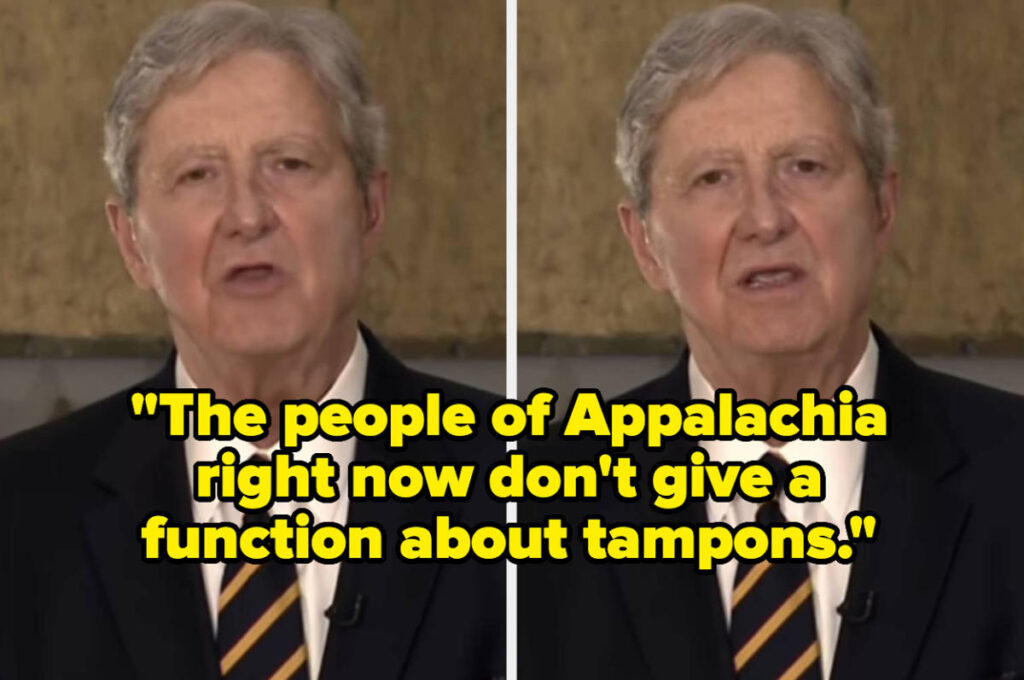In a recent segment of Fox News’s Hannity, Louisiana Republican Senator John Kennedy stirred controversy with comments regarding Vice President Kamala Harris’s recent appearance on the popular podcast “Call Her Daddy.” In his remarks, Kennedy expressed disdain for the Vice President’s discussion of topics such as tampons amidst the backdrop of Hurricane Helene’s devastation. He implied that conversations about feminine hygiene products were irrelevant to the urgent needs of the people affected by the hurricane, specifically, those in Appalachia who he believed needed more immediate assistance, such as water and escape routes.
Kennedy’s critique was met with widespread backlash on social media platforms, particularly X (formerly Twitter). Many users pointed out that his perspective reflects a broader pattern of male lawmakers failing to acknowledge or understand the needs and concerns of women. Critics emphasized that tampon access is indeed an important aspect of hurricane relief efforts, especially for women who may find themselves without essential hygiene products during such emergencies. They argued that dismissing women’s needs is part of a larger trend of Republican legislators neglecting the reality that women exist and have specific requirements that must be addressed, particularly in times of crisis.
Supporters of the Vice President pointed out that the discussions she participated in on “Call Her Daddy” are indicative of a modern approach to addressing women’s issues and breaking taboos surrounding reproductive healthcare. Harris’s involvement in conversations about feminine hygiene not only raises awareness but also emphasizes the importance of ensuring access to health products even during disasters, showing that women’s needs cannot be sidelined. Critics further argued that in crises like hurricanes, women experiencing menstruation still need access to menstrual products, illustrating the significance of comprehensive relief efforts that include these essential items.
Notably, the specific instance that sparked Kennedy’s comments highlights the difference in priorities between his perspective and the realities faced by women in such situations. The particular mention of tampons during Kamala Harris’s podcast was not a central theme of the entire discussion. Still, it served to underline an essential but often overlooked aspect of women’s health needs. This moment drew attention to the lack of understanding that many public figures, especially those in political positions, have concerning women’s issues. In response, Harris reminded listeners of her historic role in discussing reproductive health, signaling a need for greater awareness and openness about such topics.
The fact that Kennedy trivialized the importance of discussing tampons amid a disaster illustrates a recurring theme in political discourse where women’s needs are often dismissed or ignored. This moment serves as a critical reminder that, even in the face of natural disasters, women’s health and hygiene must be included in the conversation and that public funding and support should extend to these essential supplies. Ignoring such necessities risks leaving women vulnerable and adds layers of stress to a situation that is already dire.
Overall, the comments made by Senator Kennedy reflect a deeper issue in the political landscape where women’s health discussions are often marginalized. The backlash he faced underscores the necessity of ensuring that women’s voices and needs are included in planning and response efforts during crises. As public dialogue evolves, it is crucial that lawmakers educate themselves and remain responsive to all constituents’ needs, especially those traditionally overlooked in policy discussions. The intersection of disaster relief and women’s health representations remains a vital area for advocacy and improvement in political accountability, as the situation in Louisiana and similar regions continues to illustrate.

